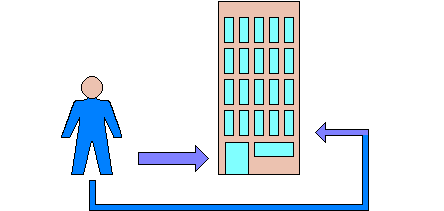I became unemployed in 1991. Before that I had been self-employed for 15 years. The skills I had developed during that time had been tuned and honed to serve my market. This was made up of clients who needed my skills here a little and there a little. Not one of my clients could have made efficient use of my full depth and breadth of skills on a permanent basis. They were ideally suited for deployment through self-employment.
The sensible way to get me off benefit would have been to re-establish me doing what I was good at in the way the market could make use of it, namely as a self-employed IT consultant. At the time, I would not have needed any money to be able to do this. All I needed was information. It would hardly have cost the taxpayer anything to get me back on my feet.
The information I needed was readily available on government databases. I needed information about my local economy. But of course the rules of job search did not facilitate the provision of such information to a lowly layabout like me. These rules also stipulated that while I could look for self-employed work, I was required actively and primarily to seek a permanent job with an employer. My aptitude profile made me ideal for self-employment but did not fit the general profile of a permanent job. I knew that. I would not give myself a permanent job.
I could not survive without money to live on. Without a job, the only source of money was 'benefit'. To receive benefit I had to demonstrate each fortnightly signing day that I had been 'actively seeking work' (a permanent job with an employer). But I was unsuitable for permanent employment. I knew that. Prospective employers knew that.
On the other hand I did not want to remain the rest of my life living on this reprehensible pittance called 'benefit'. I therefore had to seek a form of work I was likely to get. I therefore had to tout for the kind of work I was good at as a self-employed IT consultant and software developer. In other words, I had to do both. I had to apply for every job I saw advertised, and tout for consultancy work.
In an infinite marketplace this would not be a problem. There would be so many companies to choose from. I would be unlikely to tout for business and apply for a job at the same company at the same time. However, as I have become poorer and poorer over the past 10 years, my geographic radius for job searching has shrunk. I can no longer afford to travel far. The number of potential clients (who are also my potential employers) is consequently now quite small.
I therefore found myself going to a company's IT manager offering my services as an IT consultant on the one hand, while at the same time applying for any permanent IT job they were advertising via their Personnel (human resources) department.

Furthermore, I find myself applying for jobs with the same companies over and over again. One way or another, people are going to realise what is happening. One can imagine the kind of conversation taking place at the executive lunch table.
| Personnel Manager:
| "Who's that bloke?"
|
| IT Manager:
| "He's an IT consultant. I'm thinking of retaining him to advise on how we should best rationalise and upgrade our IT."
|
| Personnel Manager:
| "That's funny. He applied for that database administrator's job I advertised last week for the marketing department."
|
| Managing Director:
| "That sounds dubious. He's obviously looking for a permanent job somewhere. He's probably applying for other jobs too."
|
| IT Manager:
| "So if I take him on retainer to report on our IT and provide us with on-going advice, when I call him in a couple of weeks he may not be there any more. He could have taken a permanent job with somebody. That would leave us high and dry."
|
| Personnel Manager:
| "And if I give him that database administrator's position (which is way below his capability) he will probably also be moonlighting all the time doing consultancy on the side for other companies."
|
| Managing Director:
| "I don't like it. Note who he is so we don't get taken in if he applies again. In the meantime, leave well alone."
|
Thus have the rules of job-search forced me to destroy my own credibility within my own marketplace and hence my opportunities for getting off benefit and back into work.
Parent Document |
©Jan 2000 Robert John Morton

